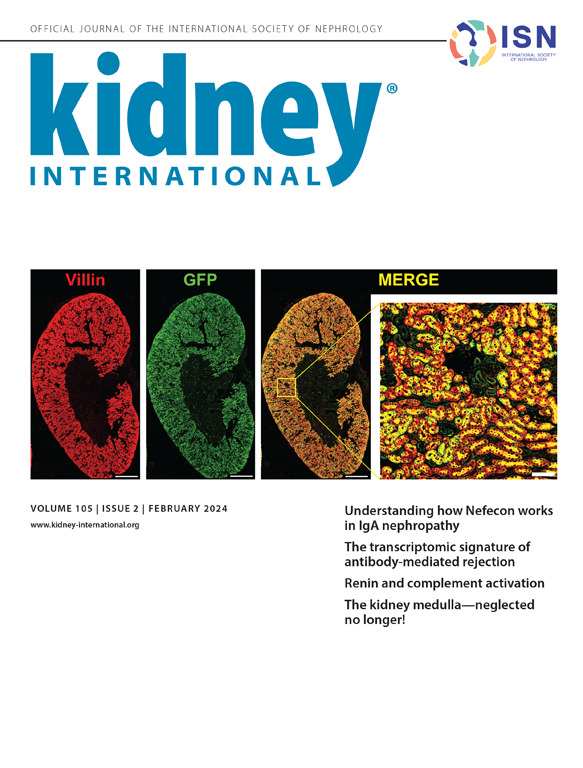Transcription factor Twist1 drives fibroblast activation to promote kidney fibrosis via signaling proteins Prrx1/TNC
IF 12.6
1区 医学
Q1 UROLOGY & NEPHROLOGY
引用次数: 0
Abstract
The transcription factor Twist1 plays a vital role in normal development in many tissue systems and continues to be important throughout life. However, inappropriate Twist1 activity has been associated with kidney injury and fibrosis, though the underlying mechanisms involved remain incomplete. Here, we explored the role of Twist1 in regulating fibroblast behaviors and the development kidney fibrosis. Initially Twist1 protein and activity was found to be markedly increased within interstitial myofibroblasts in fibrotic kidneys in both humans and rodents. Treatment of rat kidney interstitial fibroblasts with transforming growth factor-β1 (a profibrotic factor) also induced Twist1 expression in vitro. Gain- and loss-of-function experiments supported that Twist1 signaling was responsible for transforming growth factor-β1–induced fibroblast activation and fetal bovine serum–induced fibroblast proliferation. Mechanistically, Twist1 protein promoted kidney fibroblast activation by driving the expression of downstream signaling proteins, Prrx1 and Tnc. Twist1 directly enhanced binding to the promoter of Prrx1 but not TNC, whereas the promoter of TNC was directly bound by Prrx1. Finally, mice with fibroblast-specific deletion of Twist1 exhibited less Prrx1 and TNC protein abundance, interstitial extracellular matrix deposition and kidney inflammation in both the unilateral ureteral obstruction and ischemic-reperfusion injury–induced-kidney fibrotic models. Inhibition of Twist1 signaling with Harmine, a β-carboline alkaloid, improved extracellular matrix deposition in both injury models. Thus, our results suggest that Twist1 signaling promotes the activation and proliferation of kidney fibroblasts, contributing to the development of interstitial fibrosis, offering a potential therapeutic target for chronic kidney disease.
转录因子 Twist1 通过信号蛋白 Prrx1/TNC 推动成纤维细胞活化,促进肾脏纤维化。
转录因子 Twist1 在许多组织系统的正常发育中发挥着至关重要的作用,并在人的一生中持续发挥重要作用。然而,不适当的 Twist1 活性与肾脏损伤和纤维化有关,尽管其中的潜在机制仍不完整。在这里,我们探讨了 Twist1 在调节成纤维细胞行为和肾脏纤维化发展中的作用。最初发现,在人类和啮齿类动物的纤维化肾脏中,间质肌成纤维细胞内的 Twist1 蛋白和活性明显增加。用转化生长因子-β1(一种组织坏死因子)处理大鼠肾脏间质成纤维细胞也会诱导 Twist1 在体外表达。功能增益和功能缺失实验证明,Twist1 信号传导是转化生长因子-β1 诱导成纤维细胞活化和胎牛血清诱导成纤维细胞增殖的原因。从机制上讲,Twist1 蛋白通过驱动下游信号蛋白 Prrx1 和 TNC 的表达来促进肾脏成纤维细胞的活化。Twist1直接增强了与Prrx1启动子的结合,但没有增强与TNC的结合,而TNC的启动子则直接与Prrx1结合。最后,在单侧输尿管梗阻和缺血再灌注损伤诱导的肾脏纤维化模型中,成纤维细胞特异性缺失Twist1的小鼠表现出较低的Prrx1和TNC蛋白丰度、间质细胞外基质沉积和肾脏炎症。用 Harmine(一种 β-碳oline生物碱)抑制 Twist1 信号传导可改善这两种损伤模型的细胞外基质沉积。因此,我们的研究结果表明,Twist1 信号传导促进了肾脏成纤维细胞的活化和增殖,导致了肾间质纤维化的发展,为慢性肾病提供了一个潜在的治疗靶点。
本文章由计算机程序翻译,如有差异,请以英文原文为准。
求助全文
约1分钟内获得全文
求助全文
来源期刊

Kidney international
医学-泌尿学与肾脏学
CiteScore
23.30
自引率
3.10%
发文量
490
审稿时长
3-6 weeks
期刊介绍:
Kidney International (KI), the official journal of the International Society of Nephrology, is led by Dr. Pierre Ronco (Paris, France) and stands as one of nephrology's most cited and esteemed publications worldwide.
KI provides exceptional benefits for both readers and authors, featuring highly cited original articles, focused reviews, cutting-edge imaging techniques, and lively discussions on controversial topics.
The journal is dedicated to kidney research, serving researchers, clinical investigators, and practicing nephrologists.
 求助内容:
求助内容: 应助结果提醒方式:
应助结果提醒方式:


